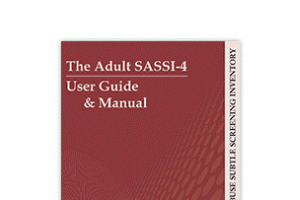Author:
The SASSI Institute
Overview:
Quickly identify adolescents and adults likely to have a substance abuse disorder
Age Range:
Adolescent Form: 12-18 years; Adult and Spanish Forms: 18+ years
Administration:
Individual or group; Paper-and-pencil; Individuals 12:0-18:0 (SASSI-A2) and 18:0 and older (SASSI-4 and Spanish SASSI)
Scoring Option:
Manual Scoring
Reading Level:
4th Grade – 5th Grade
Forms:
Adolescent, Adult, Spanish
Completion Time:
15 to 20 minutes to administer and score
Norms:
Cutoff scores based on validation studies
Publication Date:
2016
The SASSI instruments are self-report screening instruments that are designed to accurately identify adolescents and adults with a high probability of having a substance use disorder (SUD). These instruments help guide appropriate treatment and are useful in a variety of settings such as substance abuse treatment centers, criminal justice programs, behavioral health centers, social service programs, and other healthcare organizations.
The SASSI decision rules provide information on the likelihood that the client has a substance use disorder. The SASSI scale scores provide information on the client characteristics that can help in treatment planning. The SASSI include both face valid and subtle scales. The face valid scale are obvious scales that provide information on substance abuse that the clients are able or willing to acknowledge. The subtle scales are not directly related to substance abuse but are included to identify those individuals who are unable or unwilling to acknowledge relevant behaviors.
The SASSI instruments consist of the following versions:
- SASSI-4: Adult Substance Abuse Subtle Screening Inventory-Fourth Edition
- SASSI-A2: Adolescent Substance Abuse Subtle Screening Inventory
- Spanish SASSI: Spanish Adult Substance Abuse Subtle Screening Inventory
Features and Benefits
- Brief and easy to use assessment of substance abuse
- Accurate
- Does not require a professional to administer
- Objective scoring & decision rules
- Able to detect substance use disorders even in clients who are unwilling or unable to acknowledge substance misuse and symptoms associated with it
SASSI-4
The SASSI-4 identifies probability of substance abuse among adults aged 18 or older. The SASSI-4 introduced some new features:
- A new Prescription Drug Scale that can help identify individuals who are likely to be abusing prescriptions medicines.
- Screens for SUD along the DSM-5 continuum of severity ranging from mild, moderate and severe SUD.
- Distinguishes SUD from other psychological disorders
- Enhances SUD identification through subtle items that are added to the SAT scale
The Adult SASSI-4 consists of the following face valid and subtle scales:
- Face Valid Alcohol (FVA)
- Face Valid Other Drugs (FVOD)
- Prescription Drug Scale (Rx)
- Symptoms (SYM)
- Obvious Attributes (OAT)
- Subtle Attributes (SAT)
- Defensiveness (DEF)
- Supplemental Addiction Measure (SAM)
- Family vs. Control Subjects (FAM)
- Correctional (COR)
SASSI-A2
The SASSI-A2 identifies the probability of substance abuse among adolescents aged 12 to 18 years. It provides insight into clinical issues that teens face such as emotional pain, level of acknowledgement of the substance abuse, social system impact, etc.
The SASSI-A2 consists of the following face valid and subtle scales:
- Face Valid Alcohol (FVA)
- Face Valid Other Drugs (FVOD)
- Friends-Family Risk (FRISK)
- Attitudes (ATT)
- Symptoms (SYM)
- Obvious Attributes (OAT)
- Subtle Attributes (SAT)
- Defensiveness (DEF)
- Supplemental Addiction Measure (SAM)
- Correctional (COR)
- Validity Check (VAL)
- Secondary Classification Scale (SCS)
Spanish SASSI (Adult only)
The Spanish SASSI is an adult substance abuse screening instrument that is validated in clinical settings that consists of Spanish speaking adults from diverse ethnic backgrounds (e.g. Colombian, Mexican, Puerto Rican, etc.). The Administration and Scoring Instructions provide information on the development of the Spanish SASSI, detailed instructions on administration and scoring, and guidelines for interpreting results.





